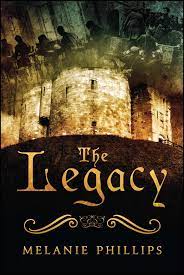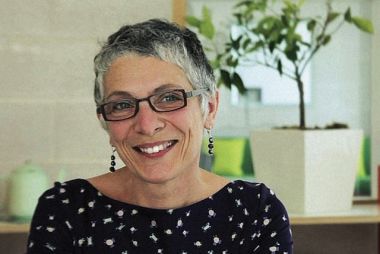There is much to appreciate in Melanie Phillips' first novel, The Legacy

Many would say that War and Peace, Tolstoy's epic 1860s chronicle of the earlier Napoleonic invasion of Tzarist Russia, experienced through the lives and loves of a number of individuals, is his greatest novel – maybe even the greatest novel ever written.
At exactly the same time, that very English genius, George Eliot (real name Mary Ann Evans), was writing what she herself considered to be her greatest novel, Romola, based on Florentine Renaissance history also seen through the private lives and loves of a number of individuals.
Both these books are, as you might expect, immensely difficult to read. The mind and heart are expected to concentrate on two disparate subjects simultaneously - with individual loves and the great events of world history panning out before us both in parallel and in tandem.
Not every reader succeeds in this endeavor and ends up having to choose one aspect as against the other, simply in order to get through the book. Not really what the respective authors – giants of the novelistic genre - would have wished of their readers.
It is therefore something of a miracle that England's greatest Jewish journalist, Melanie Phillips (now living in Israel), has managed to pull off this exacting feat in her very first novel, entitled The Legacy.
With The Legacy, Melanie, winner of the Orwell Prize for Journalism, social commentator on the London Times and regular contributor to BBC's The Moral Maze, has written a novel of intense passion and erudition about an Anglo-Jew of the type that tends to lead our community at present, i.e. self-hating, ignorant, officious – and immensely unhappy!
Gradually, however, our anti-hero (Russell Woolfe) comes to see the light (mainly through his self-harming daughter who rebels and becomes increasingly interested in her rich Jewish heritage) when it dawns on him that he had been terribly wrong, wrong, wrong.
A visit to the USA and to Israel confirms him in his growing realization that the truth is the very opposite of what the usual suspects would have us believe: observant Judaism is the only answer to hatred of diaspora Jews and of the only Jewish State in the world alike. And the young State of Israel itself is not only a haven, but absolutely essential for all Jews, especially for those in diaspora who are estranged from their own people.
Living in a London where he daily witnesses Muslim attacks on freedom of worship which are overlooked by Church authorities and the police alike, Russell recalls the stories of neo-Nazi Oswald Mosley and the Cable St. Riots – he also discovers that his father, whom he had once despised, was actually something of a hero.
But for me, the core of the book, the bits that made me weep, is the way Melanie weaves the true stories of our collective and tragic Jewish history – the stories of Roman Masada, the English York Massacre and the recent Polish contributions to the extermination of their Jewish neighbours - their despoiling of the rich Polish Jewish legacy (which continues apace as I write) - with her inimitable love for the ground and being of Jewish religious observance and of the Jewish State itself.

This is a first in any novelist, let alone one who, in her latest Times column (September 14th) is able to express the hope that the present Queen of England never dies, because unlike several other members of her family, Elizabeth 'is the quintessence of duty .. and understands ... that the duty she owes is to G-d.'
The novel also contains a fair bit of humour – the synagogue service reluctantly attended by Russell after the death of his father could have come straight out of Bar Mitzvah Boy, written in 1976 by Maureen Lipman's Mancunian husband, the late Jack Rosenthal (born just around the corner from here), the one thing in life that made my Polish-born mother laugh till she cried.
The Legacy manages to juxtapose the gentle and expert way in which wounded Hamas terrorists (the goal of whose Charter is to exterminate the entire Jewish people) are treated in Israeli hospitals (yes you read that correctly) and the fact that around one half of Israeli doctors and nurses are Arab (true), with a lyrical description of the country itself, which rang so many bells.
For instance, here is Russell's reaction on alighting at Ben Gurion airport in Tel Aviv for his first visit to the Jewish State he had once, like all good self-hating Jews, despised:
'It was the quality of the light that first struck him, as if a grey film had been lifted from his eyes. The blue of the sky, the green of the leaves, the white stone of the unexpectedly attractive airport, all seemed to possess an incandescent clarity that for some reason made him suddenly, inexplicably cheerful.'
And this, which all travellers experience on arrival in Israel - the uniquely communal Israeli taxi (sherut) experience – a fitting introduction to this completely insane, anarchic and wonderful country:
' The woman called out a question in Hebrew to the driver. He responded sharply and with another question. An argument developed. The woman started shouting and waved her arm angrily at the driver, clipping Russell round the ear. The driver jammed on his brakes, reversed the van through the terminal approaches all the way back to the taxi stand and gestured to the woman to get out. She screamed back; he shouted louder. Finally, she left. A young backpacker got on and took her place. They set off once again.'
And this, on approaching Israel's capital city, Jerusalem, itself:
'They rounded another bend and suddenly there it was ahead of them, on top of a distant hill: the city itself. Russell gasped. He was unprepared for the sight. The sun was setting, and the pale stone of the distant city seemed to be glowing like pink gold. A long, white jagged column slanting upwards on the horizon pointed like a crooked finger towards the sky... Every few minutes there was yet another breathtaking view, with golden pink villages glimmering atop the undulating, white and green Judean hills.'
Yes, this first novel by great journalist, Melanie Phillips, who always tells it how it is, manages the impossible – it weaves together many histories: Jewish, Roman, Christian, ancient, mediaeval and modern, into a search for truth, for self, for the Jewish place in the world – if at all – and the result is a lyrical gem.
It is fitting that this review should appear as we celebrate yet another Succot festival – when those that can sit outside in their temporary huts, often built up every year, and decorated with autumnal foliage and fruit, reminding ourselves yet again that life is fragile and that we cannot depend on anyone except G-d Himself.
Melanie Phillips has done us all a favour by writing The Legacy, which, as well as being a faithful portrait of contemporary Britain, is simply the best and most-rounded contemporary Jewish novel that I've read in a very long time.
Dr Irene Lancaster is a Jewish academic, author and translator who has established university courses on Jewish history, Jewish studies and the Hebrew Bible. She trained as a teacher in modern Languages and Religious Education.











